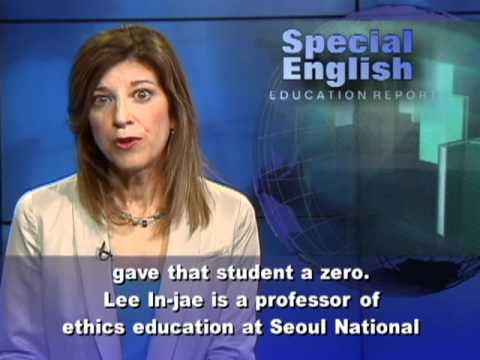South Korea's education system is highly respected. But there are concerns that academic dishonesty could harm its image in the world. That dishonesty includes cases of falsified research. And in recent months, two South Korean lawmakers have faced accusations that they copied work for their doctoral dissertations.Of course, problems like these are not limited to South Korea. In April, Hungary's president resigned after a university withdrew his doctoral title. A committee found that most of the pages of his dissertation on the modern Olympics "were either direct translations or showed partial similarity to other works." Mr. Kim is a graduate student at Korea University who asked to be identified only by his family name. He attended schools in the United States and says Americans seemed to understand that claiming other people's work as their own is wrong. He says Koreans may not yet have a well-established understanding of plagiarism and whether plagiarism is acceptable or not. A VOA reporter asked South Korea's education minister, Lee Ju-ho, how seriously he takes the problem. Mr. Lee said the problem is not as bad as it used to be. Still, he says he wants to put more effort into eliminating plagiarism. Mr. Kim, the graduate student, says current efforts to educate college students about plagiarism are not very effective. But he say British and American professors who teach at South Korean colleges are helping to fight the problem. For example, he says one professor at his graduate school found a student plagiarizing and automatically gave that student a zero. Lee In-jae is a professor of ethics education at Seoul National University of Education. He says the training should start in elementary school. He says children should learn that copying their classmates' homework or not identifying their sources of information is wrong. If they understand that, he says, then they will be able to write honest papers later in life.Michael Neil Shapiro, a Canadian, taught at seven different South Korean universities. "In Korea," he says, "there are both ancient and modern reasons for thinking that it's OK to use other people's ideas without giving specific credit." But, East or West, he says, one reason for plagiarism is the same: "intellectual laziness" and the hope not to be discovered. For VOA Special English, I'm Carolyn Presutti. You can learn more about plagiarism and learn English with our stories and activities at voaspecialenglish.com. (Adapted from a radio program broadcast 7Jun2012)

원문출처 : http://www.youtube.com/watch?v=LzqgYaj3FmM&feature=youtube_gdata






 English
English 한국어
한국어
